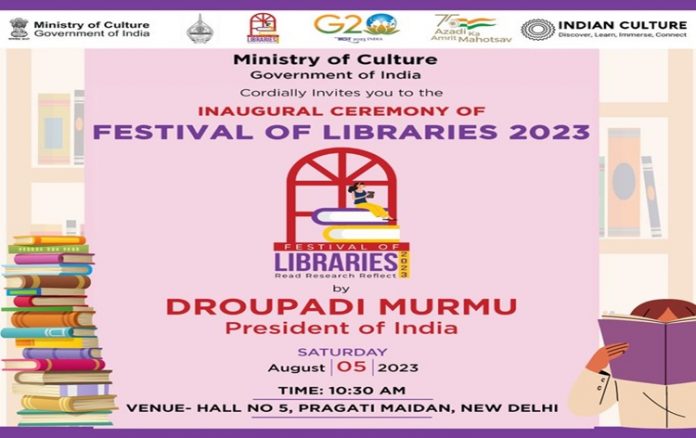The Ministry of Culture is organizing a unique “Festival of Libraries 2023”, held on the 5th – 6th August 2023 at Hall No. 5 Pragati Maidan, New Delhi. President of India Smt. Droupadi Murmu will inaugurate the Two-day festival. Vice President of India, Sh. Jagdeep Dhankhar will grace the Valedictory Ceremony of the event. The festival will also highlight iconic libraries from across the world in order to initiate a conversation on the modernization and digitization of libraries in India.
This festival is a part of the second phase of the ‘Azadi ka Amrit Mahotsav’ and is in line with the Prime Minister’s vision to foster the development and digitization of libraries and cultivate a culture of reading in India. It aims to facilitate the formulation of action-oriented policies for the development of Model Libraries in India, right down to the village and community levels.
The festival will also mark the launch of a special ranking system for libraries across India, further promoting excellence and innovation in the library sector. The event will culminate with a valedictory function which will be graced by the Vice President of India, Sh. Jagdeep Dhankhar.
Noteworthy highlights include the launch of a crowd-sourced Directory of Libraries and the signing of a Tripartite MoU between three prominent libraries: Khuda Baksh Oriental Public Library, Patna; Rampur Raza Library, Rampur; and Maulana Abul Kalam Azad Arabic Persian Research Institute, Tonk, for long term collaborative events, commencement of celebration of 250 years of the Rampur Raza library, Launch of the Sassy Library Series with the plot based on Rampur Raza Library, and the release of a set of Cursive Writing Books in the 22 vernacular languages.
The Festival of Libraries is a unique event that aims to engage and inspire participants from the entire ecosystem of libraries. The festival will commence with an inaugural function being presided over by President of India, along with the launch of new initiatives and publications.
The event will include roundtable discussions and panels where participants can explore library best practices from Indian states and libraries worldwide. There will be engaging conversations with organizers of literary festivals, young authors, publishing houses, and more. Special sessions will focus on schemes for libraries and their collections, including National Missions on Libraries Manuscripts and Archives.
Visitors will have the opportunity to experience 10 captivating exhibitions showcasing Cartographic archives, Calligraphy Types & Cursive Writing Styles in 22 vernacular languages from across India as well as Tribal fonts through theme-based exhibitions.
Another important feature will be Archives, Oral Histories & their Exhibition: There will be sessions on digitization of archives with special emphasis on private archival collections. An exhibition on rare archival collections, and illuminated manuscripts has also been planned.
Drawing Rooms: There will be four theme-based drawing rooms set up, one each for book-author sessions, digital display, flip books and podcasts; human library project and Indian Culture Portal.
The Children’s Zone will have special hands-on activity zones for children with Readathon, Build-a-Bookshelf, Treasure Hunt, Organize-Your-Home-Library etc. to inculcate the habit of reading and to enable them to develop a relationship with books, reading, writing, and speaking.
The event aims to bring together stakeholders across the board, from librarians & academics to district collectors of 100 aspirational districts & directors of model libraries to develop a roadmap for encouraging Libraries to become the Drawing Rooms of the Community and for the Readers to emerge as future Leaders, in consonance with the spirit of a country that reads, is a country that leads.
The government’s National Mission on Libraries (NML) launched in 2014 further underscores its dedication to enhancing libraries across the country. This mission develops model libraries, connect district libraries with digital networks, and prioritize libraries in economically backward districts.
















